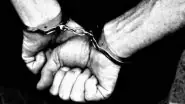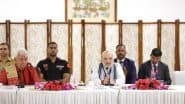Kingston (Jamaica), Mar 27 (AP) US Secretary of State Marco Rubio on Wednesday said the State Department will re-evaluate its travel warnings for Jamaica and other countries to ensure they reflect real conditions on the ground.
As part of a tour of the Caribbean, Rubio heard complaints from Jamaican officials about the warning for their country, which is heavily dependent on tourism.
Also Read | NATO Secretary General Mark Rutte Says '4 American Soldiers Who Went Missing in Lithuania Have Been Killed'.
The current travel warning for Jamaica advises Americans “to reconsider” visiting the country due to high crime rates.
While agreeing to re-look at the travel advisory, Rubio defended the Donald Trump administration's opposition to a Cuban government programme that sends physicians and other medical workers to countries in need of such personnel, including Jamaica.
Also Read | US Tariffs: President Donald Trump To Announce Tariffs on Auto Imports at White House News Conference.
Jamaican Prime Minister Andrew Holness said his nation had benefitted greatly from the programme that the Trump administration claims violates international labour standards and amounts to human trafficking in some instances.
Rubio's trip will take him from Jamaica to Guyana and Suriname as the administration increasingly turns its attention to the Western Hemisphere.
Rubio is also focused on weaning Caribbean countries from their dependence on Venezuelan oil and combating illegal immigration.
Donald Trump recently announced new sanctions on Venezuelan oil exports. The Republican president has threatened to impose tariffs on goods imported into the U.S. by other countries that buy oil from Venezuela.
On the Jamaica travel warning, Rubio did not promise it would be eased but did say revisions were possible in light of progress the Jamaican government has made in reducing crime.
"We pledged (that) we're going to go back and reevaluate the travel advisories as they currently stand to ensure that they do reflect the reality of the new numbers and what the numbers show," Rubio said, noting that Jamaica has "made very impressive progress in your general numbers overall when it comes to the murder rate and so forth".
Holness said he appreciated Rubio's pledge.
"We are committed to working collaboratively to ensure that travel advisories reflect the current realities and promote travel to Jamaica. I'm confident that the dialogue initiated today will lead to tangible outcomes," he said.
Holness also strongly defended the Cuban doctor programme and said Jamaica ensured that the physicians and nurses sent by Havana were protected by Jamaican labour laws.
"Let us be clear, the Cuban doctors in Jamaica have been incredibly helpful to us," he said, adding that Jamaica has a shortage of domestic health workers because many have migrated to other countries.
"We ensure that they are treated within our labour laws and benefit like any other worker. So any characterisation of the programme by others certainly would not be applicable to Jamaica. We are ensuring that our programme complies with all the international laws and standards to which we are a party to," Holness said.
American officials have said the programmes resemble organised human trafficking because the medical professionals are not paid directly.
Latin American leaders have denounced the US position, saying any sanctions imposed for participating would deprive their people of much needed medical assistance.
Ahead of Rubio's trip, Trump's special Latin America envoy, Maurico Claver-Caron, had suggested that if the leaders the secretary meets on his trip focus on the programme, it would be a waste of time.
But Rubio appeared to acknowledge that at least some participants, including Jamaica, may be complying with international standards.
“They basically operate as forced labour in many places. Now there are places that have better labor standards. Perhaps Jamaica is one of those. And that's fine," Rubio said.
"Every country operates the programme differently, and obviously because of our relationship with Jamaica, we're going to engage with them on that and talk about it further and have a better understanding. Perhaps none of this applies in the way it's handled here," he said.
Another main issue for Rubio will be the situation in Haiti, where a multinational peacekeeping force has been in place for months, struggling to prevent gangs from taking over the country.
Rubio on Tuesday spoke with the president of Kenya, which is leading that force, although the State Department account of the call made no reference to Haiti.
Rubio has extended waivers on an overall US foreign aid freeze to continue to fund the security force in Haiti, but it remains unclear how long they will last. (AP)
(This is an unedited and auto-generated story from Syndicated News feed, LatestLY Staff may not have modified or edited the content body)













 Quickly
Quickly
















